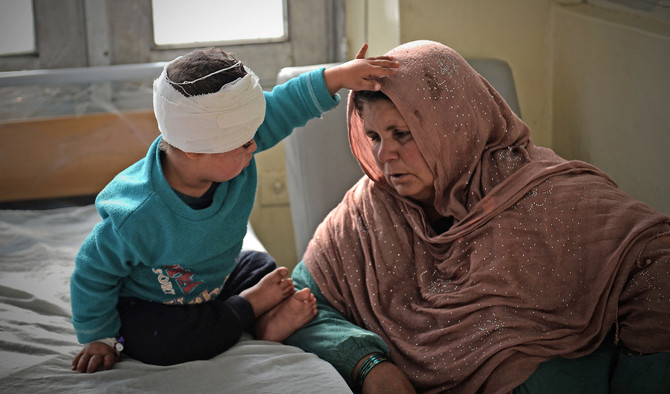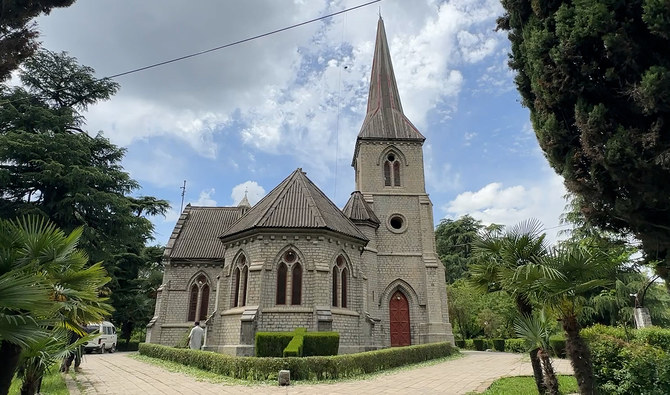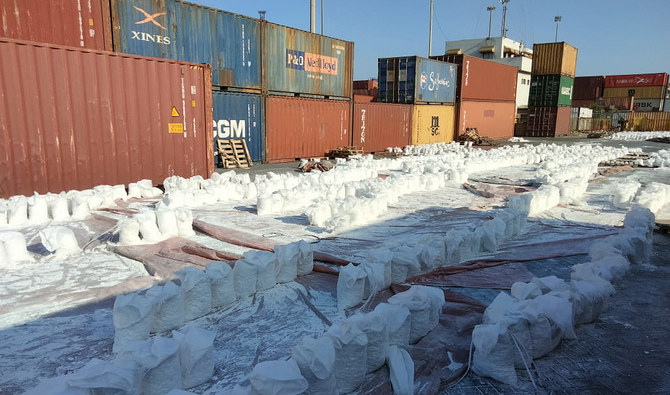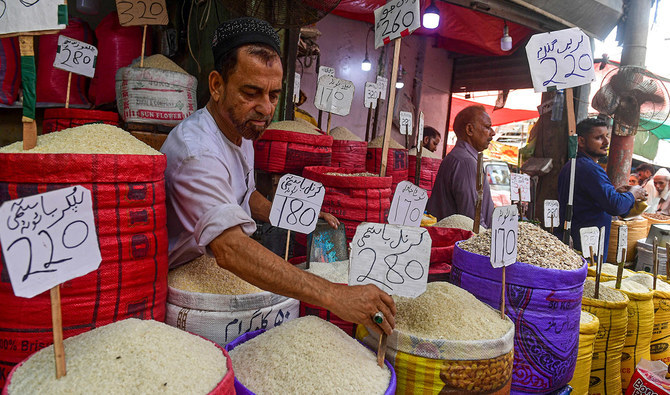KABUL: The Taliban on Tuesday claimed responsibility for a major truck bomb attack which killed a group of people and wounded more than 100 others in the Afghan capital overnight.
Afghanistan’s National Security Adviser, Hamdullah Mohib, warned that the perpetrators will be brought to book and called the raid as an attempt at “sabotaging the peace process”.
He made the comments following a series of meetings with authorities of several countries, including Saudi Arabia, to discuss progress in the peace talks which the US began with the Taliban a few months ago to resolve a 17-year-old conflict plaguing the country.
“While we are endeavoring for peace and stability as well as forming a regional consensus, the enemy is using any means for sabotaging the peace process,” he said in a statement.
“I vow that we will not be silent against this crime of theirs. We will investigate and shall take avenge too,” he added.
According to the Interior Ministry, four people, three of them police, lost their lives in the attack which took place in the “Green Village” where a series of compounds run by foreign security firms are located. More than 110 people, many of them civilians, were wounded in the attack, officials said.
The Taliban released a statement saying that the target of their attack was a US intelligence base. The “Green Village” lies near residential areas and the Taliban’s last attack took place there a few months ago.
Despite holding talks with US diplomats in recent months, the militants have also stepped up their attacks, inflicting heavy losses among Afghan troops in recent months.
The Afghan government, which is secluded from the meetings due to conditions set by the Taliban, has also increased its operations with the backing of US-led troops.
The insurgents have lost fighters in the battle too, while civilians have fallen victims to both sides of the turf war. Meanwhile, the government has replaced the interior and defense ministers with two of its staunchest anti-Taliban figures last month.
“Through the attack last night, the Taliban want to show that they will not bow down to the military pressure,” Waheed Mozhdah, an analyst, told Arab News.
Separately, based on the Afghan government’s repeated requests, Pakistan detained a few family members of the Taliban representatives recently, Mozhdah said.
Kabul has demanded that Pakistan puts pressure on the militants operating on its soil in order to be privy to peace talks with it. One latest reported arrest includes Hafiz Mohibullah, a former Taliban minister.
The government’s spokesmen said they are not aware of his arrest while the Taliban’s spokesman, Zabihullah Mujahid, rejected the reports.
“The arrests have been going on for some time and even include women and children of some of the Taliban members. Let us see what happens with the arrest. Will Kabul be satisfied with them and will the Taliban give in to it? Only time can tell this,” Mozhdah said.
He added that Pakistan had forced Mullah Abdul Ghani Baradar to visit Qatar in order to begin separate talks with US officials and members of the Kabul government.
Baradar, a former deputy to Taliban’s late supreme leader, was arrested by Pakistan and jailed years several years ago. Pakistan released him recently based on Washington’s request.
Afghan Taliban claims responsibility for massive Kabul blast
Afghan Taliban claims responsibility for massive Kabul blast

- Officials vow to reciprocate against attempt to “sabotage peace process”
- Follows a series of meetings to end decades-old conflict in the country
In scenic Abbottabad, an old church tells a tale of religious unity, colonial heritage

- St. Luke’s Church was built in 1864 on land donated by Queen Victoria, empress of India
- Can seat up to 150 worshippers, expanding into outdoor area to host larger crowds
ABBOTTABAD: Located in Abbottabad, a picturesque city set against the mountainous terrain of Pakistan’s northwestern Khyber Pakhtunkhwa province, the 160-year-old St. Luke’s Church has a tale to tell of religious unity and the region’s colonial history.
Built in 1864 during British rule, the Anglican-Protestant church was established to serve British officials serving in the Indian subcontinent. Construction of St. Luke’s commenced in 1854-55, with initial delays due to slow fund-raising and then a brief interruption due to the Indian Rebellion of 1857. It was completed and then consecrated by the Bishop of Calcutta in 1864.
Despite disruptions during the partition of British India in 1947 and the birth of Pakistan, the church has continued to host mass and retained many of its original architectural elements.
“During its construction, the church’s exterior was built with stones that were cut and laid by hand,” Rev. Rafiq Javed, a priest at the church appointed by the Diocese of Peshawar, told Arab News this week, explaining the history of St. Luke’s Church.
“The inner part [of the church] is built using mud, lentils, jute, sawdust, and paste made of eggs. The eggs were provided by the local people.”
St. Luke’s Church retains many elements from the time of its construction, such as stained-glass windows and old locks and their gigantic keys. A pipe organ stands in the church foyer.
Javed said the musical instrument had become unusable due to water damage some 50 years ago but its sound was once well known across the Abbottabad valley.
The church walls display plaques dating back to 1865 and serving as a memory of fallen British soldiers. One also comes across a metallic device permanently fixed on one of the stairs at the church’s entrance that was used by British troops to remove mud from their shoes before going to the main hall for worship.
The local Christian community says the church property was donated by Queen Victoria, empress of India, and one of its gates was named after her. The church property comprises the vicar’s home as well as staff quarters for caretakers of the building.
The church seats up to 150 worshippers, expanding into the outdoor area to accommodate larger crowds during special occasions such as Christmas and Easter.
Christianity, the third largest religion in Muslim-majority Pakistan, is followed by 1.27 percent of the population, according to the 2017 Census. The community has roughly equal proportions of Catholics and Protestants, with a small number of Eastern Orthodox and Oriental Orthodox Christians as well. There are around 4,000 Christians in Abbottabad, according to local estimates.
Javed the priest said the building of the church was a community effort:
“At the time, the people who lived here included Hindus and our Muslim brothers as well and they also lent a hand in building this church. The eggs [to make paste] were provided by the local Hindu and Muslim communities.”
Google to establish fifty AI-equipped smart schools in Pakistani capital

- Smart schools incorporate technology and innovation in teaching and learning processes to improve quality of education
- Smart schools in Islamabad will be equipped with 30,000 Google for Education IDs with AI features and digital tools
ISLAMABAD: US tech giant Google is all set to establish 50 smart schools in Pakistan’s federal capital offering AI features and a suite of digital tools for “enhanced collaboration and productivity,” Pakistani state media reported this week.
A smart school incorporates technology and innovation in its teaching and learning processes to improve the quality of education. Smart schools use various technologies such as interactive whiteboards, online learning platforms, artificial intelligence and virtual reality to enhance the learning experience of students.
Experts say smart schools lead to improved student engagement and motivation, personalized learning, access to a wider range of resources, and enhanced communication between teachers, students, and parents. Smart schools also promote collaborative learning, critical thinking, and problem-solving skills among students.
A Google for Education team and its local partner Tech Valley met this week with the Secretary of the Ministry of Federal Education and Professional Training to present its proposals for Pakistan’s education sector, including setting up smart schools.
“50 Smart schools in Islamabad will be equipped with 30,000 Google for Education IDs which includes features, powered by AI, like practice sets and a suite of digital tools for enhanced collaboration and productivity,” the APP wire agency reported.
“Discussions extended to several upcoming initiatives, including teacher workshops on Google for Education tools, the establishment of a public Google Reference School, the training of 2,000 youths in job-ready skills through Google Career Certificates, and the potential collaboration on hosting an Edutech event with the Ministry of Federal Education in Pakistan.”
According to the “Global Education 2020” report issued by UNESCO, there has been a significant increase in the use of technology in education worldwide. The report indicated that 90 percent of the world’s countries have launched initiatives to integrate technology into education, and 80 percent of students in advanced countries use technology in education.
As per a report by “Holistics,” a business intelligence and data analytics platform, Smart School technology has also been adopted by many countries in Asia, including Singapore, China, and South Korea, and has proven to be effective in improving the quality of education and learning outcomes.
The size of the Smart School market is expected to reach $73.8 billion by 2025 compared to a market size of $43.6 billion in 2018, marketing research company “Markets and Markets” said in a recent report.
Pakistan inflation eases to 22-month low at 17.3% in April amid monetary tightening

- Pakistan beset by inflation above 20% since May 2022, registering high of 38% in May 2023 due to high food, energy costs
- Pakistan is currently navigating strict reforms as part of an International Monetary Fund bailout program
KARACHI: Pakistan’s inflation eased off to 17.3%, the lowest since May 2022, on a year-on-year basis in April 2024 from 20.7% recorded in March 2024 and 36.4% in April 2023, official data issued on Thursday said.
Pakistan has been beset by inflation above 20% since May 2022, registering a high of 38 percent in May 2023 main due to high food and energy costs.
Pakistan’s central bank, which has kept the interest rate steady at 22% since June last year amid tight monetary tightening, had forecasted that ” inflation will continue to remain on downward trajectory further moderation.”
“Besides the coordinated tight monetary and fiscal policy response, other factors that have led to this favorable outcome include lower global commodity prices, improved food supplies and high base effect,” the central bank said in its monetary policy statement issued on Monday.
On a month-on-month basis, inflation decreased to 0.4 percent in April 2024 as compared to an increase of 1.7% in the previous month and a hike of 2.4% in April 2023, according to the Pakistan Bureau of Statistics (PBS) .
In April on an annual basis the prices of onions increased by 156.16 percent, tomatoes 126.67 percent, chicken 33.62 percent and meat 22.18 percent. In the non-food category, gas charges surged by 318.74 percent, electricity charges 71.12 percent, accommodation services 31.50 percent, transport services 26.70 percent, cotton cloth 23.00 percent, drugs and medicines 22.78%, and footwears 21.38%.
Urban core inflation measured by non-food non-energy items increased to 13.1 percent on an annual basis in April 2024 as compared to an increase of 12.8 percent in the previous month and 19.5 percent in April 2023.
Rural core inflation measured by non-food non-energy items increased to 19.3 percent on a year-on-year basis in April 2024 as compared to an increase of 20 percent in the previous month and 24.9 percent in April 2023.
Pakistan’s drug enforcement agency nets record ‘ice’ haul in major anti-trafficking operation

- The Anti-Narcotics Force seizes 224 kilograms of the substance while it was being transported to Belgium
- The authorities also apprehended three suspects, among them two Afghan nationals, who were trying to escape
ISLAMABAD: Pakistan’s Anti-Narcotics Force (ANF) announced on Thursday it had achieved a “monumental victory” in the ongoing battle against drug trafficking by intercepting the largest consignment of methamphetamine, popularly called “ice,” in the nation’s history.
Methamphetamine, known for its potent and addictive properties, has seen a significant rise in use not just in Pakistan but globally, contributing to a burgeoning health crisis.
The drug’s accessibility and escalating abuse have heightened law enforcement and public health efforts to curtail its spread.
This major seizure highlights the ongoing challenges and the critical need for continued vigilance and international cooperation in combating drug trafficking and its societal impacts.
“A total of 224 kilograms of Methamphetamine (Ice) was seized by the diligent ANF team at the Karachi port,” an official statement announced. “Disguised within five containers labelled as ‘Soapstone’ exports from Afghanistan to Belgium, this illicit substance was artfully concealed within the container’s roof and doors.”
The authorities also apprehended three suspects involved in the smuggling attempt, among them two Afghan nationals.
“The suspects were attempting to flee to Afghanistan via the Torkham border when they were intercepted by ANF Team,” the statement continued.
It added the intercepting the massive methamphetamine consignment by ANF prevented its distribution and potential harm to countless people.
Pakistan’s inflation sees lowest increase in nearly two years at 17.3% in April

- Pakistan has been beset by inflation above 20% since May 2022, registering a high of 38% in May 2023
- Month on month inflation was down 0.4%, showing negative growth for the first time since last year in June
KARACHI: Pakistan’s Consumer Price Index (CPI) for April rose 17.3% from a year earlier, data from the Pakistan Bureau of Statistics showed on Thursday, the lowest reading in nearly two years and below the finance ministry’s projections for the month.
Pakistan has been beset by inflation above 20% since May 2022, registering a high of 38% in May 2023, as it has navigated reforms as part of an International Monetary Fund (IMF) bailout programme.
Month on month inflation was down 0.4%, showing negative growth for the first time since June 2023.
The Finance Ministry in its monthly economic report said it expected inflation to hover between 18.5% and 19.5% in April and ease further in May to 17.5%-18.5%.
Pakistan’s central bank kept its key interest rate unchanged at 22% for the seventh straight policy meeting on Monday, hours before the IMF executive board approved $1.1 billion in funding under a $3 billion standby arrangement signed last year.
The bank’s monetary policy committee said in a statement it was “prudent” to continue with its monetary policy stance at this stage to bring inflation down to the target range.









